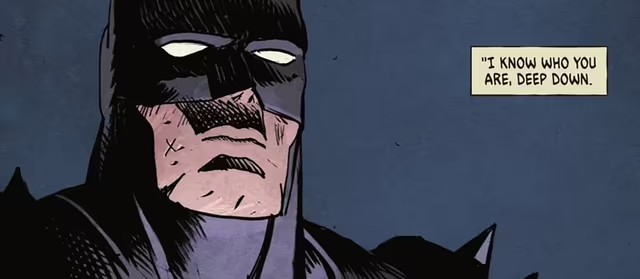If you click on a link and make a purchase we may receive a small commission. Read our editorial policy.
Superman, Patron Saint of the Socially Awkward who just desperately wants to connect with people
How Clark Kent and Superman attempts to understand and be a part of humanity as a superhero and a journalist.

Popverse's top stories
- Where to find Popverse at Seattle's Emerald City Comic Con 2026
- The Traitors US alum Bob the Drag Queen drops a piece of advice for future players: "You are not as good at this game as you think you are"
- Bridgerton season 4 ending explained - did Benedict and Sophie make it work, and who's leaving the show for good?
After so many months of news stories, rumors, and trailers, James Gunn’s Superman is finally here this week. And over the last few months the buzz around the film has had me thinking a lot about the character. DC superheroes didn’t have much place in my comic book pantheon growing up. Until Keith Giffen, J.M. DeMatteis, and Kevin Maguire got their hands on the Justice League, DC heroes seemed more like gods than human beings.
The one exception was Christopher Reeve’s Superman. The 1978 Superman movie version of the character still possessed all the powers of his comic book counterpart, quite literally stopping a speeding bullet shot by a mugger at Lois early in the film, and at the end reversing the actual rotation of Earth and with it somehow the passage of time to save her life once again. We didn’t even blink at the preposterousness of the idea that the planet actually works like a VHS tape. He was Superman. Of course he could make that work.

But the thing that drew me to Reeve’s portrayal was that he didn’t lead with any of that. This wasn’t the story of a god who walked among us, but a well-intentioned and frequently awkward person trying to fit in and do some good. Over the years I’ve gone back and forth about whether or not Clark’s clumsiness is 100% performance, some physical comedy to accompany those glasses and his weirdly slicked down hair in creating a disguise. But every time I watch him try to make his way through the Planet’s revolving door, I don’t see brilliant choreography or a long con. I see a guy who genuinely trips over his own feet, someone who has probably fallen down an escalator or two because he was too busy talking to someone and misjudged a step, or has found himself way off course to the local deli because of something else that had caught his interest.
It’s interesting rewatching the 1978 movie: Clark always stumbles at the moments that he’s trying to connect with people. He turns to talk to Perry and the door slams in his face. He walks into the ladies’ room without noticing because he’s having a conversation Lois. At the revolving door he reaches out to shake the hand of one of his new colleagues, and almost loses it when the door and colleague spin away. That’s really my image of Reeve’s Superman in a nutshell: extending his hand, earnestly or even desperately wanting to connect, in a world that often doesn’t value that, or only sees the clumsiness of his attempts.

Growing up, I could certainly relate to the idea of a socially awkward hero. I was the kid in school who always raised his hand in class and went up to other kids on the playground and asked if they wanted to be friends. The nice ones ignored me, others delighted in tormenting me, and I was baffled by all of it. What was I doing wrong? I felt like there was some secret instruction manual on fitting in that I never got. I wasn’t an actual alien from another planet, but sometimes I sure felt like one.
In Christopher Reeve’s Superman, I got to see someone like me. And it really was true of the whole of his character, not just Clark. Superman was certainly smoother than his secret identity. But down deep he had that same struggle to connect: The fact that he saw the good in people also meant he had a hard time appreciating the selfish or the bad.

And when Lois dies, his grief is overwhelming. The entire earthquake sequence of the movie is unexpectedly horrifying. Director Richard Donner really takes his time with it, giving Superman a number of genuinely scary developing dilemmas to solve while elsewhere Lois is slowly buried alive and crushed to death moaning “Help me, help me.” When Superman pulls her body from the wreck he stumbles backwards with her disturbingly pale corpse in his arms, unable to fully take it in. Even knowing that he’d lost his birth family and world, and his adopted father, too, he just can’t conceive of such a tragedy, that all his hard work could in the end still prove to be not enough. And Donner keeps us there for what seems like a long time, watching in silence as he simply sits with Lois’ body before he finally flies off shrieking, desperate to quite literally reach her.
When storytellers give Clark’s choice to be a reporter serious consideration (which is not often), they tend to see his writing as an outgrowth of his broader mission as Superman to take down bad guys. But that actually feels more like Lois’ mission as a reporter than Clark’s. She’s the one with the intense drive to take down corporate villains and also the audacity to say that to their faces. It feels personal with her, which makes sense: As originally imagined, she was working in a field dominated by men and their misogyny. She knew exactly what injustice looked like and how it gets covered up.
Clark doesn’t have any of that background. And if justice like this was his main goal, he could have done lots of other things, including just be Superman. Why be a reporter instead?
In my own life, journalism has been about coming to a greater understanding of myself and others, and also perhaps a greater intimacy. To agree to be interviewed or profiled by someone is an act of enormous trust. As a journalist you feel the weight of that, the responsibility to proceed with openness and curiosity. And if there is trust and openness, you end up being allowed into someone’s world, which is an incredible privilege, and sometimes a great surprise. The so-called villains often prove more compelling than you expect, and the heroes more complicated. Reporters talk about keeping an objective distance from their subjects, but honestly I usually walk away with a deep affection and gratitude for the people about whom I write.
I wonder if it’s the same for Clark. Maybe at his core he’s as Reeve imagined him, a sweet, awkward kid from another planet who wants to help, but even more wants to connect.
James Gunn's Superman movie is out now - and we have a lot to say about it. You can also read about Superman's S-Shield through the ages, how Superman and Clark Kent keep their secret identity secret, our recs for best Superman comics, and how to watch all his TV series and movies in order.
Follow Popverse for upcoming event coverage and news
Find out how we conduct our review by reading our review policy
Let Popverse be your tour guide through the wilderness of pop culture
Sign in and let us help you find your new favorite thing.
















Comments
Want to join the discussion? Please activate your account first.
Visit Reedpop ID if you need to resend the confirmation email.